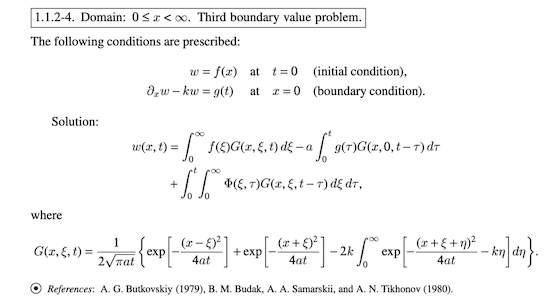I see that in the official documentation, there are only instructions for the first or second boundary value problems.
$\frac{\partial w}{\partial t}=a \frac{\partial^2 w}{\partial x^2}+\Phi(x, t)$ with Domain: $0 \leq x<\infty$. Third boundary value problem. The following conditions are prescribed: $$ \begin{array}{rlll} &w=f(x) &\text { at } t=0 \text { (initial condition), } \\ &\partial_x w-k w =g(t) \quad &\text { at } x=0 \text { (boundary condition). } \end{array} $$
Although the textbook provides the Green Function for this problem, I still want to know if Mathematica can solve this problem on its own?
For information on this issue in the textbook, please refer to the link: https://ibb.co/HV2JnS2



